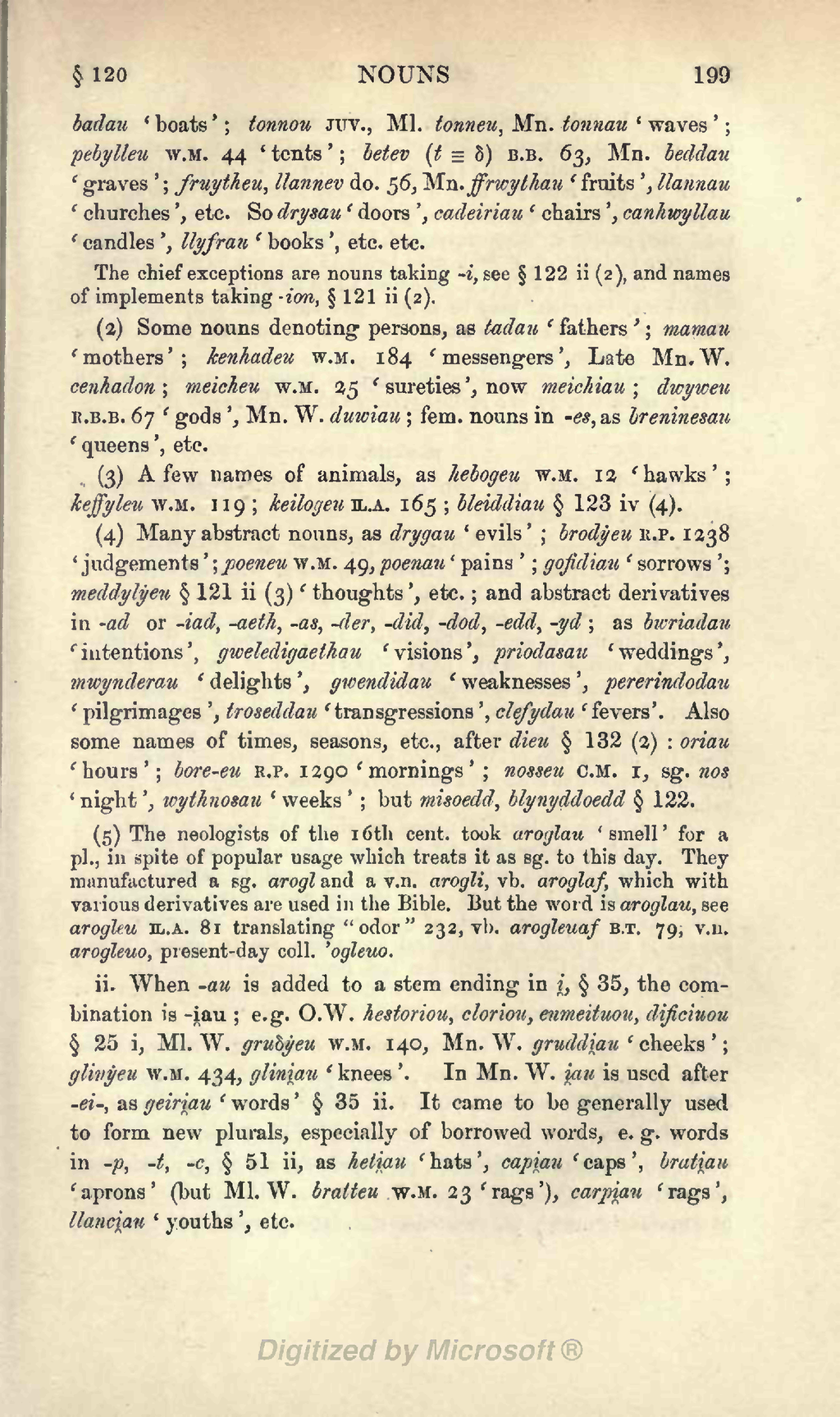badau ‘boats’; tonnou juv., Ml. tonneu, Mn. tonnau ‘waves’; pebylleu w.m. 44 ‘tents’; betev (t ≡ ẟ) b.b. 63, Mn. beddau ‘graves’; fruytheu, llannev do. 56, Mn. ffrwythau ‘fruits’, llannau ‘churches’, etc. So drysau ‘doors’, cadeiriau ‘chairs’, canhwyllau ‘candles’, llyfrau ‘books’, etc. etc.
The chief exceptions are nouns taking ‑i, see § 122 ii (2), and names of implements taking -ion, § 121 ii (2).
(2) Some nouns denoting persons, as tadau ‘fathers’; mamau ‘mothers’; kenhadeu w.m. 184 ‘messengers’, Late Mn. W. cenhadon; meicheu w.m. 25 ‘sureties’, now meichiau; dwyweu r.b.b. 67 ‘gods’, Mn. W. duwiau; fem. nouns in ‑es, as breninesau ‘queens’, etc.
(3) A few names of animals, as hebogeu w.m. 12 ‘hawks’; keffyleu w.m. 119; keilogeu Ỻ.A. 165; bleiddiau § 123 iv (4).
(4) Many abstract nouns, as drygau ‘evils’; brodẏeu r.p. 1238 ‘judgements’; poeneu w.m. 49, poenau ‘pains’; gofidiau ‘sorrows’; meddylẏeu § 121 ii (3) ‘thoughts’, etc.; and abstract derivatives in ‑ad or ‑iad, ‑aeth, ‑as, ‑der, ‑did, ‑dod, ‑edd, ‑yd; as bwriadau ‘intentions’, gweledigaethau ‘visions’, priodasau ‘weddings’, mwynderau ‘delights’, gwendidau ‘weaknesses’, pererindodau ‘pilgrimages’, troseddau ‘transgressions’, clefydau ‘fevers’. Also some names of times, seasons, etc., after dieu § 132 (2): oriau ‘hours’; bore-eu r.p. 1290 ‘mornings’; nosseu c.m. 1, sg. nos ‘night’, wythnosau ‘weeks’; but misoedd, blynyddoedd § 122.
(5) The neologists of the 16th cent. took aroglau ‘smell’ for a pl., in spite of popular usage which treats it as sg. to this day. They manufactured a sg. arogl and a v.n. arogli, vb. aroglaf, which with various derivatives are used in the Bible. But the word is aroglau, see arogleu Ỻ.A. 81 translating “odor” 232, vb. arogleuaf b.t. 79, v.n. arogleuo, present-day coll. ’ogleuo.
ii. When ‑au is added to a stem ending in i̯, § 35, the combination is ‑iau; e.g. O.W. hestoriou, cloriou, enmeituou, dificiuou § 25 i, Ml. W. gruẟẏeu w.m. 140, Mn. W. gruddi̯au ‘cheeks’; glivẏeu w.m. 434, glini̯au ‘knees’. In Mn. W. i̯au is used after ‑ei‑, as geiri̯au ‘words’ § 35 ii. It came to be generally used to form new plurals, especially of borrowed words, e.g. words in ‑p, ‑t, ‑c, § 51 ii, as heti̯au ‘hats’, capi̯au ‘caps’, brati̯au ‘aprons’ (but Ml. W. bratteu w.m. 23 ‘rags’), carpi̯au ‘rags’, llanci̯au ‘youths’, etc.
